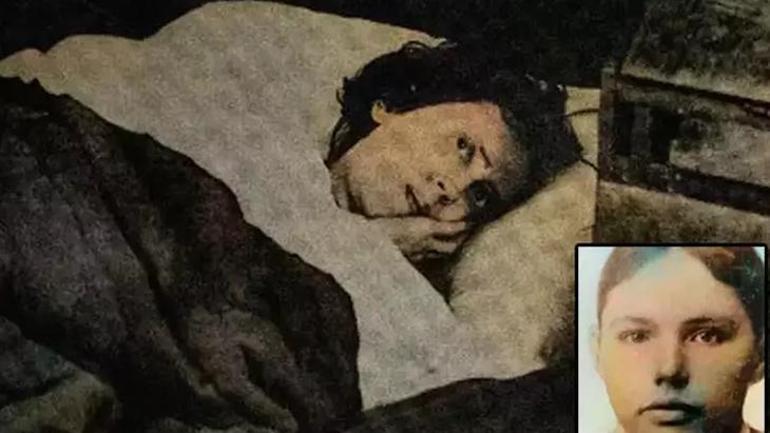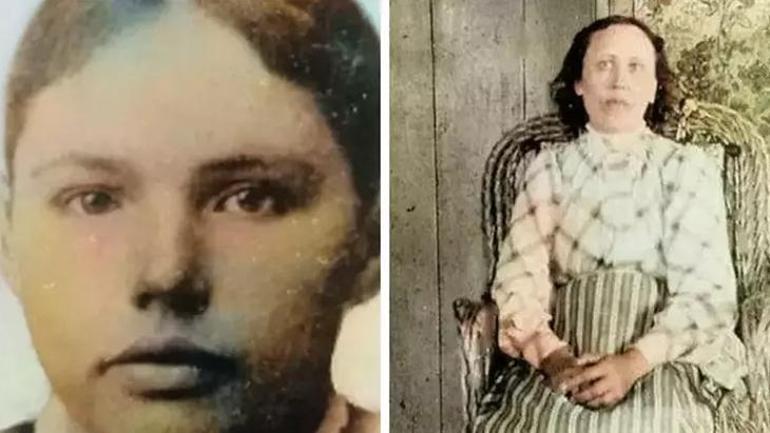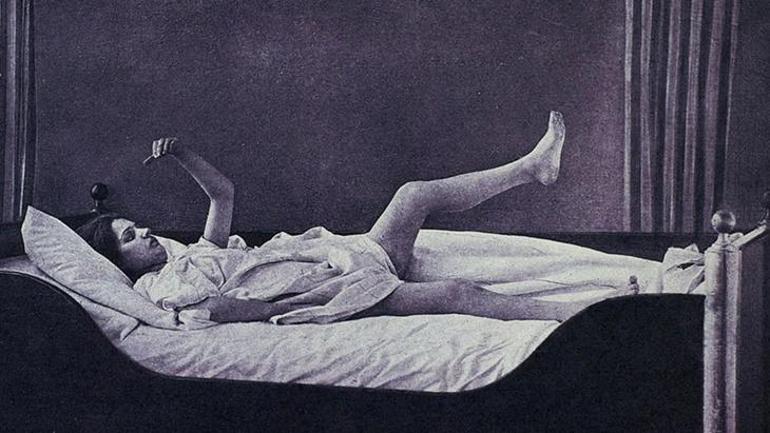Almost a century apart! Amazing partnership, they couldn't wake up for days...

Betül Yasemin Keskin / Milliyet.com.tr - Have you ever felt like you slept for days after waking up after just a few hours of nap? Sometimes due to tiredness, sometimes due to illness, or sometimes due to an inner distress that you can't name, your body whispers to you, "You need to sleep." However, sleeps that last longer than a day are often a sign of a serious health problem beyond ordinary fatigue. Just like Karolina Olsson, who lived in the Oknö region of Sweden in 1876. When she was only 14 years old, she slept one night and didn't wake up for 32 years. But this is not just a secret from the past. A very short time ago , a 26-year-old young woman in Samsun slept one night in a similar way and lived for 56 days without waking up.
These types of cases are far beyond the romanticism of the 'sleeping beauty' in fairy tales. Because what lies behind each of them is serious scientific, psychological and sometimes even neurological problems. And perhaps without realizing it, we are all facing this invisible threat.

HE FELL INTO A 32-YEAR SLEEP
Karolina Olsson lived in the Oknö region of Sweden and the first 14 years of her life were normal like those of her peers. However, in 1876, she fell and hit her head on the ground on her way back from school on an ordinary day. When she came home and told her family about the situation, they immediately intervened. After a short while, the little girl had no problems anymore . However, she ran home with a deep toothache and a swollen face on her way back from school. This time, her family convinced their daughter to go to bed and rest and that she would be fine by the morning. Little Karolina went to bed and could not get out of bed that night for 32 years.
Months passed, the family was desperate. 6 years after Karolina fell asleep, her family took her to the doctor. They were devastated once again when they saw that their daughter did not wake up despite being given an electric shock. Karolina's condition was contrary to all the studies done on sleep disorders up until that day . The doctors who saw her could do nothing but be surprised, but they had an idea. According to the doctors, Karolina could have had a stroke related to dementia. However, they could never prove this and Karolina was unfortunately left to her fate. What was interesting was that although she had been sleeping for years, her mind was quite active. According to the observations, Karolina was reacting to the events around her with small facial expressions. Years followed one another, her mother, who was looking after the little girl, passed away. Her family, who had hired a nanny to look after her, were astonished one morning after 32 years. On April 3, 1908, a noise was heard from Karolina's room. Her nanny went upstairs and found Karolina crawling on the floor, her eyes open and crying. Karolina, who woke up from her 32-year sleep, could not remember anything. Within a few weeks, Karolina regained her strength and speech. It was strange in every way that she woke up at the age of 46 from a sleep she had fallen asleep at the age of 14, and that she had lain there for 32 years with her eyes closed without saying a single word. Neither science nor spiritual views could explain what she had experienced during those years. Many theories were written about her, people talked among themselves. However, after sleeping for 32 years, she came back to life and despite the dozens of lost years, she lived a healthy life for another 42 years.

THIS TIME THE PLACE IS SAMSUN! SLEPT FOR 56 DAYS
Karolina's story has been remembered for years as one of the most interesting events in history. Although there was no medical equivalent to what she experienced at the time, doctors recently clarified what a 26-year-old young woman in Samsun experienced after a series of tests. The 26-year-old young woman, whose name was not disclosed, was brought to Ondokuz Mayıs University ( OMU) Medical Faculty Hospital by her relatives with a diagnosis of depression . Doctors sounded the alarm for the patient, who was unconscious and whose condition was getting worse.
Stating that the young woman woke up with ECT treatment on the 56th day after falling asleep, Dr. Özgür Kılıç, Faculty Member of the Department of Internal Medicine, Department of Internal Medicine, Faculty of Medicine, OMU, said, "When she was referred to us, we started monitoring her in intensive care. The patient did not open her eyes, did not even respond to painful stimuli, she was lying rigidly."
They thought for a long time about finding a reason why the young woman, whose neurological, metabolic, infectious, toxic and endocrine tests were all normal, had been sleeping for 56 days. Finally, experts who came to the conclusion that what the young woman, who was sleeping as if frozen, was experiencing could be of psychiatric origin, evaluated the situation in a council consisting of psychiatry, neurology and intensive care specialists. Finally, it was decided that the young woman might have suffered from 'Catatonia' syndrome, which is a result of depression.

HE WOKE UP AS A RESULT OF THE TREATMENTS: 'IT IS DIFFICULT TO DESCRIBE THAT MOMENT'
Describing the patient's awakening process, Dr. Faculty Member Kılıç stated that they started ECT treatment after diagnosing catatonia . Stating that the patient opened his eyes on the morning of the 56th day, after the 5th session, Dr. Faculty Member Kılıç said , " He looked at us, ate . It is really hard to describe that moment. This case showed that depression is not just a state of sadness, but can sometimes have such a deep effect that it can completely silence a person and prevent them from living. This was not only a medical story, but also a human story of hope. It was the triumph of science, teamwork and patience ."
Experts who emphasized that depression is a serious health problem that should not be taken lightly helped the young woman open her eyes again with the diagnosis and treatment they applied. So what is 'atatonia', which most of us have probably heard of for the first time in our lives? Psychotherapist Specialist Dr. Azad Günderci states that catatonia is a psychiatric syndrome that manifests itself with a serious slowdown or complete cessation of a person's movements, speech and reactions.
Spec. Dr. Azad Günderci stated that it would be more accurate to think of catatonia as a syndrome rather than a disease in itself, and that those with catatonia can show many different serious symptoms, and said , "Some may become rigid, frozen, or very immobile like a statue and may not respond to anything around them. Some may remain in strange body positions for a long time and when their position is changed, they may remain in that position for a long time. We call this immobility or posturing. Sometimes, a person may suddenly become extremely restless, repetitively active or aggressive for no apparent reason. These are a wide range of symptoms, but they all indicate a serious deterioration in a person's motor and mental state ." He added that the most common symptoms of catatonia include immobility, not speaking (mutism), strange body positions, meaningless repetitive movements (echolalia or echopraxia) and insensitivity to the environment.

"Catatonia is usually not a disease in itself, but a symptom of another underlying psychiatric or physical disorder, like a warning sign. It is usually seen in severe psychiatric disorders such as bipolar disorder, major depression and schizophrenia. Physically, catatonia can sometimes be triggered by brain tumors, epilepsy, infections, certain medications or substance use, infections, metabolic or neurological disorders or even certain medications. Therefore, when we see catatonia, our first job is to understand what is causing it. It is vital to identify the underlying cause." - Expert Dr. Azad Günderci
'RAPID TREATMENT IS A MUST IN CATATONIA'
Reminding that catatonia treatment should be done urgently, Specialist Dr. Günderci emphasized that treatment is started after evaluating the patient's general health status and vital functions, and that it is very important to find the underlying cause of catatonia. He gave information that treatment is usually started with a group of drugs called benzodiazepines and that these drugs mostly provide rapid improvement or even benefit within hours. He added that if benzodiazepines are insufficient, electroconvulsive therapy (Electro Convulsive Therapy) can be used . He emphasized that there may be many prejudices among the public about electroconvulsive therapy, but that this treatment method provides quite effective and rapid improvements in catatonia, is a life-saving method in resistant cases and is also a reliable method in terms of side effects. In addition to all these, he reminded that while emergency treatments are applied, treatments should definitely be planned for the underlying disorder, that it is important to ensure the patient's nutrition and to apply supportive treatments.
'IT IS POSSIBLE FOR HIM TO RETURN TO HIS FORMER HEALTH'
After such a difficult process, the question of whether recovery after catatonia is possible came to mind. Specialist Dr. Günderci said, " Catatonia usually responds very well to timely, early and appropriate treatment and most patients recover completely. Since catatonia that is not treated in time can lead to serious problems, early diagnosis and treatment are important here as in all disorders. While doing all these, we should never forget or neglect the underlying cause or disease because that is what we really need to treat. The thing that will determine the preservation of the patient's well-being in the long term is the plan made for the treatment of the underlying disease " and concluded his words.
milliyet



